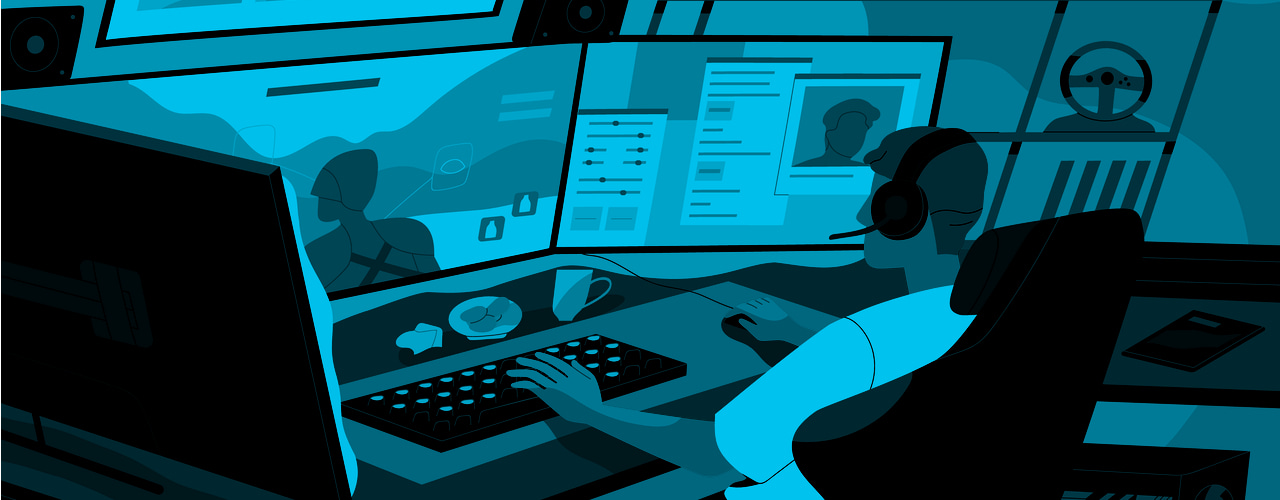Famously, John Lennon’s aunt told him that “A guitar’s all right, but you’ll never earn your living by it.” And, as soon as he did, Lennon responded by affixing a brass plaque with those words to the instrument that brought him worldwide fame.
Several generations later, Millennials and Gen Zers who have grown up being told that they play too many video games — and that their hobby will never result in anything worthwhile — can now feel vindicated: Gaming is a huge market, and making a living playing video games is no longer a flight of fancy, but rather a serious career prospect — from streaming to online reviews to unboxing videos.
For instance, since 2014 — when the first varsity esports programs were established — competitive gaming has become an important part of college sports. In fact, ESPN reports that there are now more than 125 such programs in the U.S.
Even before the pandemic, gaming could be pursued either as a job or as a hobby from pretty much anywhere. All you needed to get started were a stable internet connection and a computing device. But, what if you’re also interested in sharing your passion with other like-minded individuals at conventions or still enjoy browsing at your local video game or equipment store? Or, what if you even want to get into competitive gaming in college?
If any of these scenarios sound like you, CommercialCafe has drawn up a list of 10 U.S. cities for gamers who are looking to access a wider range of gaming experiences. Keep reading to find out what these places have on offer.
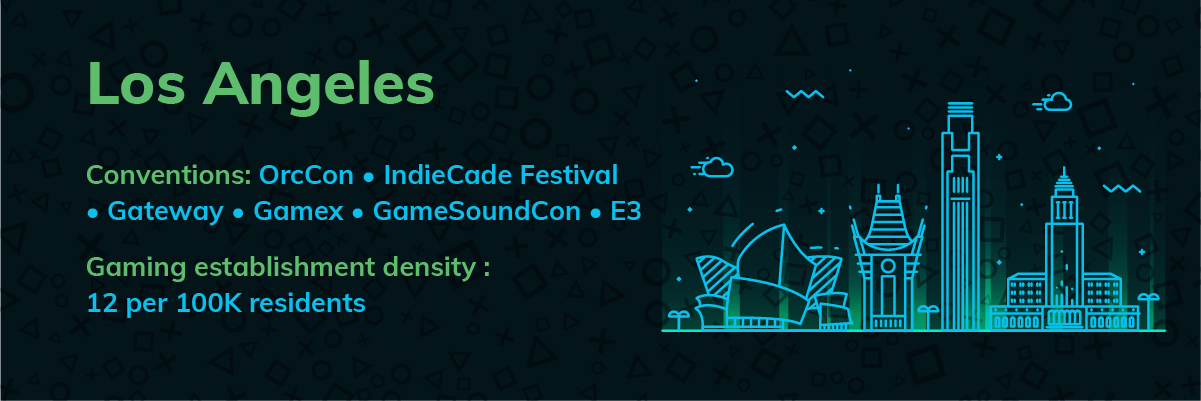
Average internet speeds in Los Angeles hover around 96.8 Mbps, with 87.7% of households having a broadband subscription. There are also 12 gaming- and equipment-related establishments per 100,000 residents.
Gamers living in Los Angeles have a full event calendar, with three conventions run by Strategicon — Orccon, Gamex & Gateway — as well as GameSoundCon (a conference focusing on music in games, sound design and virtual reality audio) and the massive industry highlight of the year that is E3.
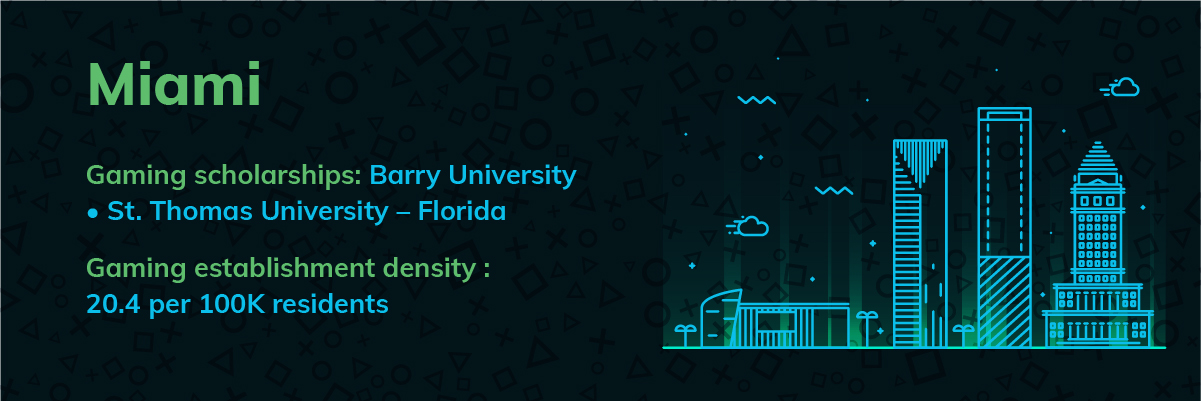
Miami has one of the largest concentrations of gaming and gaming equipment companies among the cities surveyed, boasting no fewer than 20.4 such establishments for every 100,000 residents. Plus, some 91.8% of households have at least one computing device and 70.8% have a broadband subscription. Miami also performs very well in terms of internet speeds. At 115.3 Mbps, its behind only Austin on this list.
Notably, Barry University’s esports scholarship forms an integral part of the institution’s existing Computer Information Science program. Here, students not only have the opportunity to hone their competitive gaming talents, but also to build skillsets for a future career in tech; game design or development; virtual reality; or computer animation.
Meanwhile, those enrolled at St. Thomas University – Florida in the varsity esports program can compete at the National Association of Intercollegiate Athletics (NAIA) and Florida Sun Conference levels.
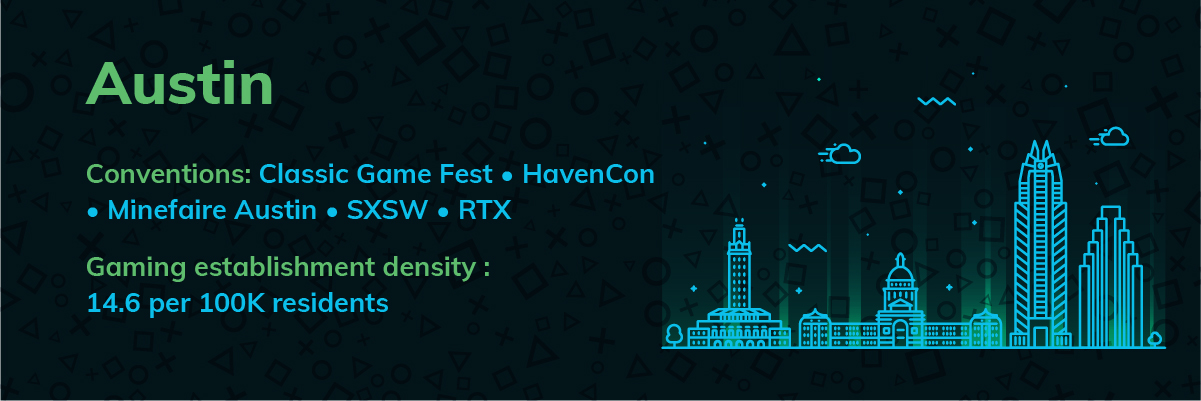
In Texas, both Austin and Dallas are serious when it comes to creating an environment in which gamers and gaming communities can thrive: Between them, the two cities host eight gaming conventions – including SXSW, Fan Expo Dallas (previously known as Dallas Comic Con) and QuakeCon.
In terms of esport scholarships, Austin’s Concordia University – Texas competes in the American Southwest Conference (Division III). And, although colleges in Dallas don’t currently have such programs, there are a host of nearby locations that do, such as Texas Wesleyan University in Fort Worth or University of Texas in Richardson.
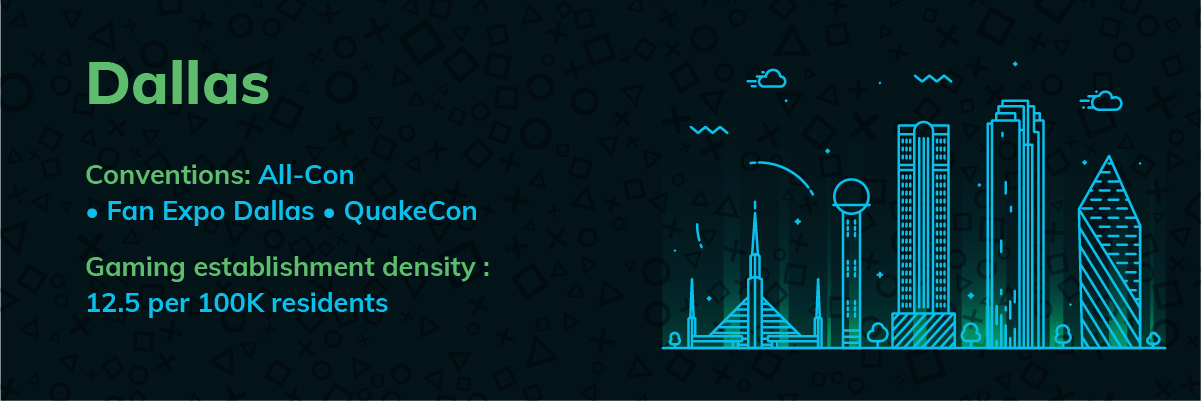
Back in Dallas, some 81.6% of households have a broadband subscription, with average internet speeds of 96.8 Mbps. But, Austin holds the advantage with an 89.2% coverage and an average speed of 117.9 Mbps.
There’s also a good supply of gaming, gaming hardware and electronics stores in both cities: 14.6 establishments per 100,000 residents in Austin and 12.5 per 100,000 in Dallas.
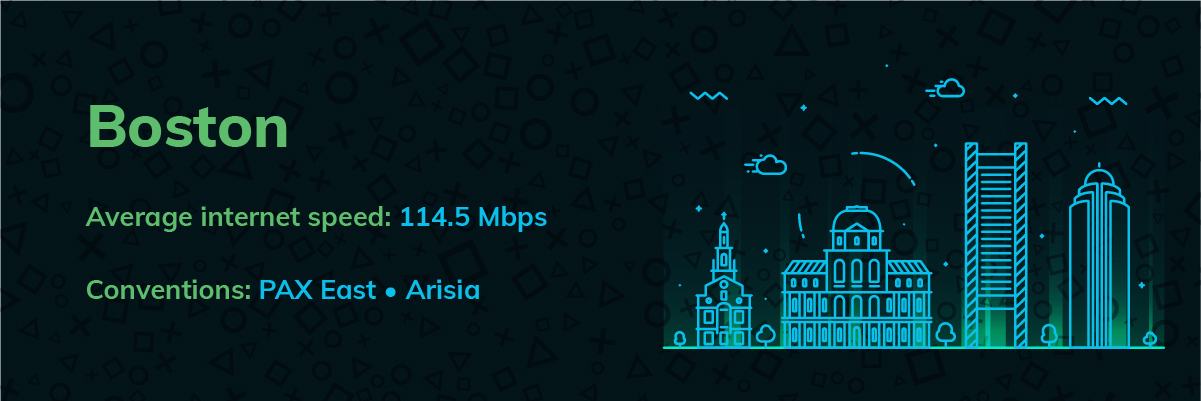
Boston is home to PAX East and Arisia, a sci-fi-focused convention that also includes gaming and anime events. Some 92.7% of households here have at least one computing device, and there are nine gaming establishments for every 100,000 residents.
Roughly 87.4% of households have an internet subscription and, with average speeds of 114.5 Mbps, Boston’s broadband is considerably speedier than the national average (currently at 99.3 Mbps). Furthermore, more than 98% of the city has access to gigabit internet speeds — a boon for heavy internet users.
In terms of esports scholarships, Bay State College players compete locally, regionally and nationally in tournaments for titles, such as “League of Legends,” “Fortnite,” “Overwatch” or “Madden.” Students also benefit from a dedicated training space in Back Bay — an area that’s also home to some of the most coveted Boston office space, as well as hotels and restaurants.
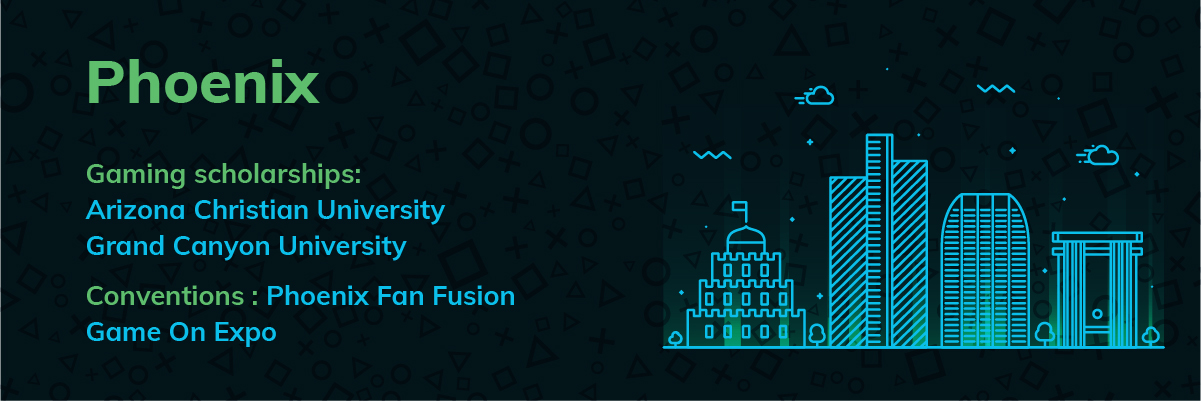
To the west, Phoenix Fan Fusion — formerly known as Phoenix Comicon or Phoenix Comic Fest — is one of the main pop cultural events in the Southwest, bringing together gamers, as well as anime, manga, comics, card and boardgame enthusiasts. Since 2015, the city has also hosted Game On Expo, the largest gaming convention in Arizona.
Students enrolled in the Grand Canyon University esports program compete in the Western Athletic Conference and the Rocky Mountain Athlete Conference. Meanwhile, those at Arizona Christian University currently compete in the Golden State Athletic Conference and NAIA.
There are also 8.5 gaming establishments per 100,000 residents in Phoenix, and 84.9% of households are connected to the internet with an average speed of 86.2 Mbps.
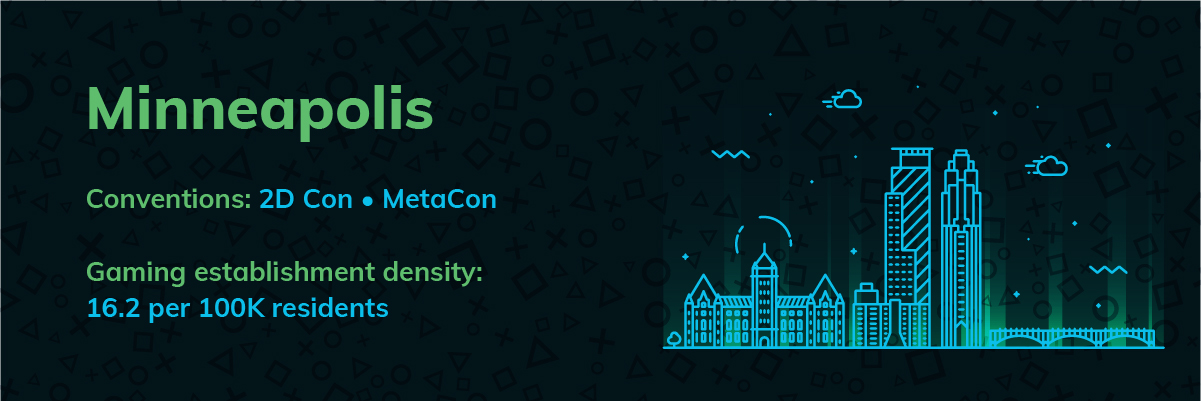
Home to several game-developing companies, Minneapolis has a gaming establishment density of 16.2 per 100,000 residents — one of the highest in the Midwest.
And, although the city doesn’t have any esports scholarships at the moment, it does host two important conventions: The first is 2D Con, which caters to both casual and competitive gamers. Then, there’s MetaCon — a grand entertainment expo filled with interactive events, guest stars, artists and entertainers — another highlight of the local geek community.
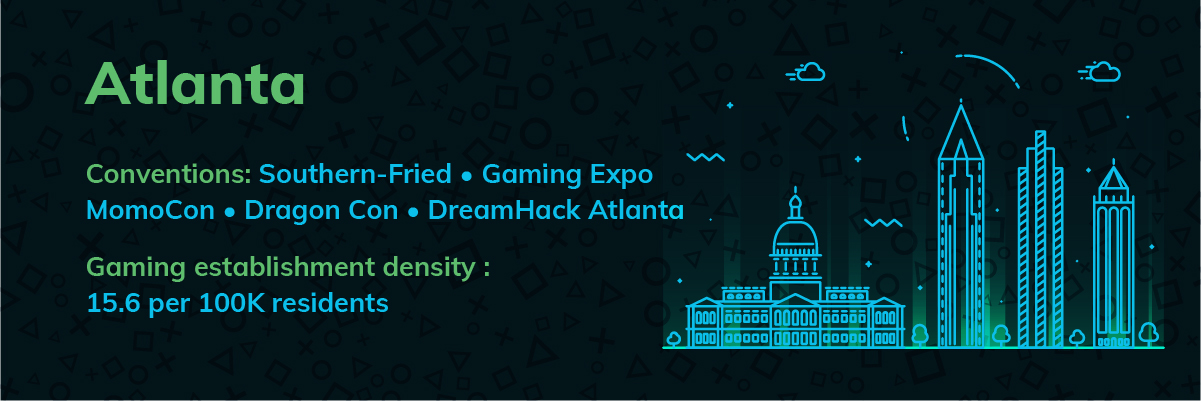
Back east, roughly 87.9% of households in Atlanta have an internet subscription, and the average speed here hovers around 92.7 Mbps. The city also has a generous share of gaming establishments — 15.6 such firms per 100,000 residents — as well as a busy convention scene, with four events throughout the year.
Georgia State University is part of the National Association of Collegiate Esports and the Georgia Esports League (GEL). Students enrolled in this program can compete at the national and regional levels in “League of Legends,” “Smite” and “Brawlhalla” matches. The scholarship also offers access to game design, media entrepreneurship and computer science classes.
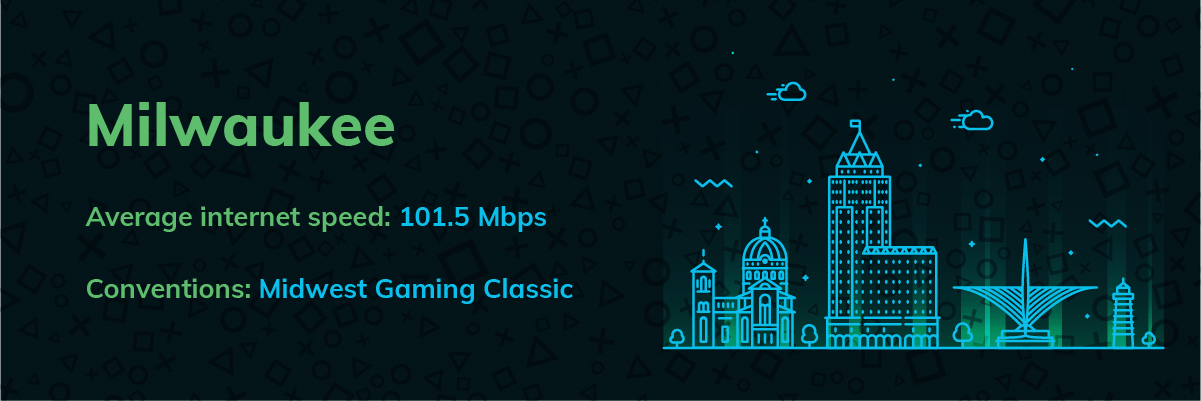
In 2019, approximately 89% of households in Milwaukee had at least one computing device, and internet speeds in the area averaged 101.5 Mbps. There were also 9.7 gaming establishments for every 100,000 Milwaukeeans.
For students interested in competitive gaming, Bryant & Stratton College is the local option for an esports scholarship. Specifically, the school’s esports program aims to develop problem-solving, team-building and virtual cooperation skills, in addition to their players’ prowess. Ideally, these abilities would then translate into any adjacent fields of work that these students might transition into at some point in the future.
The Midwest Gaming Classic takes place at the Wisconsin Center and is a meeting place for everyone from coin-operated arcade nostalgics to pinball machine or video game fans. And, for those with a markedly competitive streak, the convention offers plenty of tournaments for all brands of games. There’s also a wealth of vendors of boardgames, card games and even two Tesla cars that serve as their own arcades with games playing on their dashboards.
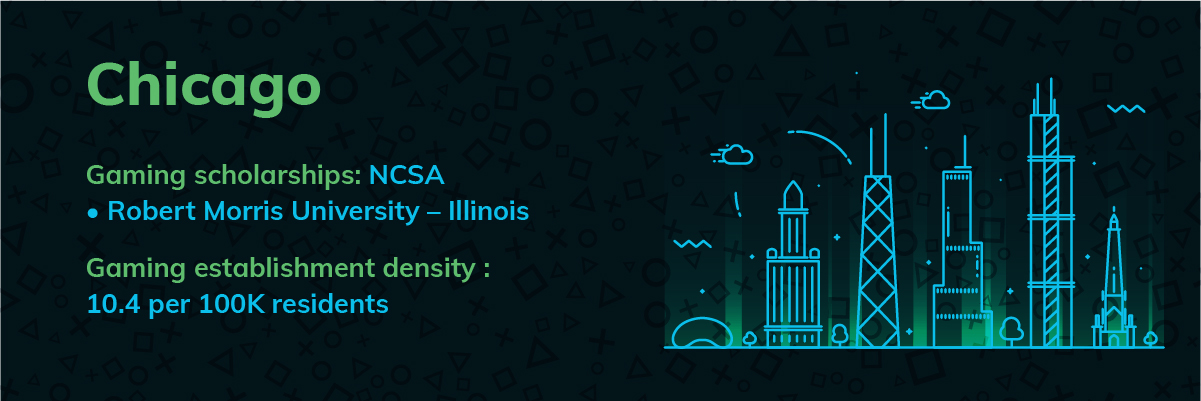
Chicago doesn’t just enjoy games. It also develops them. The city ranks among the top five places for game developers in the U.S. — ahead of New York. Furthermore, Chicago’s 19 active studios also place it among the world’s greatest cities for game development.
Robert Morris University-Illinois has had a varsity esports program since 2014, featuring games such as “Call of Duty” and “Overwatch.” Next College Student Athlete (NCSA) — the world’s largest and most successful college athletic recruiting network helping young gamers identify and secure scholarship opportunities— has also had an esports program since 2018.
Some 83.6% of households in Chicago have an internet subscription, with average speeds of 100.6 Mbps. The city also boasts a good share of gaming establishments at 10.4 firms per 100,000 residents.
A huge number of tech startups used coworking and shared offices as their launching pads, and unicorns in the gaming world are no exception. If you’ve decided working on games suits you better than being a professional gamer, a coworking office may be just what you need to get into a focused mood and rub shoulders with the right people. Check out our selection of the best coworking offices in some of the hottest coworking markets in the U.S.:
Methodology
“Computing devices” – Households with one or more computing devices (Census, 2019)
“Internet subscription” – Households with broadband internet subscription (Census, 2019)
“Internet speeds” – Average speed expressed in Mbps (Broadbandnow, 2019)
“Gaming conventions” – Number of conventions taking place strictly within the limits of a particular city (VideoGameCons and proprietary research)
“Gaming scholarship” – Colleges with varsity esports programs
“Gaming establishment density” – Includes games rental establishments, hardware stores, peripherals, electronic software stores per 100,000 residents. NAICS codes: 423430, 443142, 532282, 713120.
If a city is in multiple counties, only the county that contains the largest portion of the city was used in the calculation (County Business Pattern, 2019).
NAICS codes and titles used to define gaming establishments
“423430//,” “Computer and computer peripheral equipment and software merchant wholesalers,” “Game software merchant wholesalers”
“443142//,” “Electronics stores,” “Video game software stores”
“532282//,” “Video tape and disc rental,” “Computer video game rental”
“713120//,” “Amusement arcades,” “Electronic game arcades”

